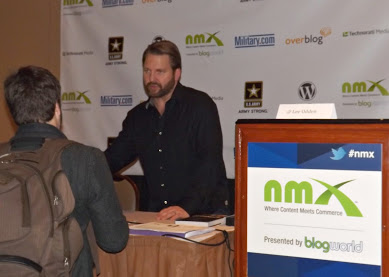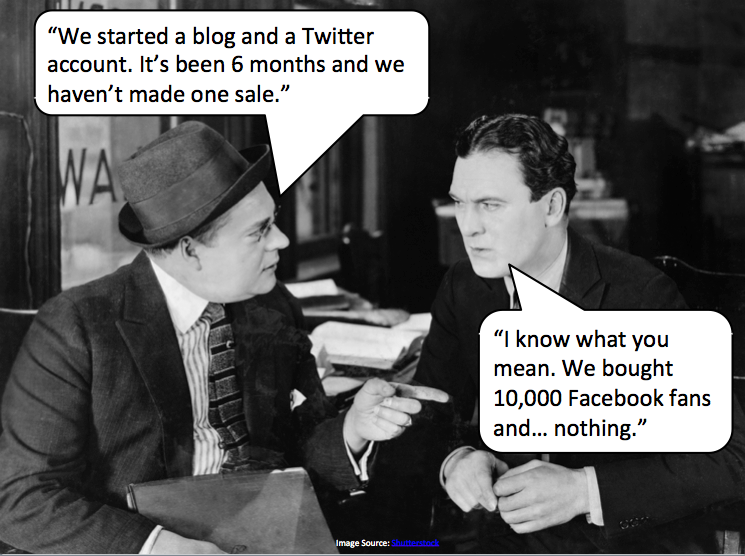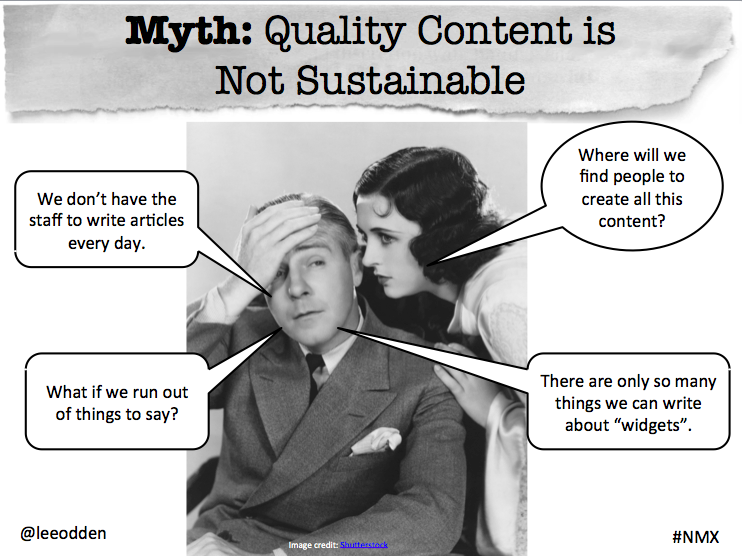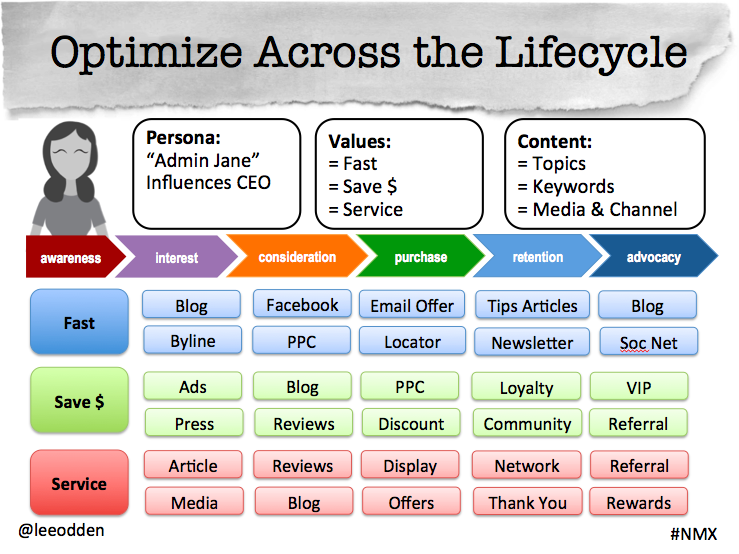 Our CEO at TopRank Online Marketing, Lee Odden (@leeodden), shared his War of Words: Myth-Busting Social, Content Marketing and SEO yesterday at NMX Las Vegas.
Our CEO at TopRank Online Marketing, Lee Odden (@leeodden), shared his War of Words: Myth-Busting Social, Content Marketing and SEO yesterday at NMX Las Vegas.
The premise of Lee’s presentation was actually crowdsourced; the title War of Words comes from H.G. Wells’ War of the Worlds, which was turned into a radio program by Orson Wells and spawned a mass fear that Mars aliens were on their way to take over Earth. There is much misinformation in content marketing, social media and SEO that the hype spreads much like the alien myths of days gone by, says Lee.
Is SEO Dead?
This is perhaps one of the most widely held myths, Lee points out. People get a lot of attention for proclaiming SEO dead. Yet SEO leads still have a 14.6% close rate, compared to outbound leads such as direct mail or print, with a 1.7% close rate. Over 100 billion people search Google every month; I think we can safely call this one busted.
Will Social Will Replace Search?
Will we ever rely solely on friends to help us find every product or service we need? Let’s hope not. Search and social are not mutually exclusive, he says. An optimized approach is required and this uses elements of both search and social in the most successful online marketing campaigns.
The truth about search and social and they are used in tandem by customers to discover, consumer and engage. Lee cites a GroupM study that found the path to purchase from search was 51%, but that from search and social combined was a healthy 48%. Clearly, they work best together. One will not replace the other, not as long as customers use search for ideation and social for validation.
Does Your CEO Belong on Social Media?
You need look no further than UFC’s Dana White to bust this myth out of the water. Is UFC so successful because White is prolific in social, or is he so involved in social because of the success of his business? It’s probably a combination of both, Lee says, noting that social myths spread fast and furious thanks to the popularity of the medium.
What’s the ROI of Social Media?

Measuring ROI using an old-style yardstick has led to this myth’s popularity, says Odden. Yet 33% of millenial consumers are more likely to buy from a brand that has a Facebook page. Fifty percent of Twitter followers are more likely to purchase from brands they follow. We need to stop thinking of social in the same way as email marketing or direct mail.
Is Quality Content Sustainable?

This myth was borne of the struggle for business people to come up with quality, interesting, engaging content on a regular basis. This struggle doesn’t make it impossible, though.
The solution to a never ending stream of high quality, relevant content that gets results over a long period of time, says Odden, is to know the customer journey.
Understand the types of information most relevant for your customers for:
- Awareness
- Consideration
- Purchase
- Retention
- Advocacy
Marketers must understand where newsletters, forums, blogs, social media, and other efforts fit into the customer journey and how they are used to attract, engage and convert customers. The sentiment that quality content is not sustainable is a myth that has been effectively busted.
How to Move Past Marketing Myths and Optimize Across the Customer Lifecycle

How do you take your understanding of your customer and distill it into a content plan? It’s important to develop customer personas, says Odden; to understand the customer and his or her values. The next step is in identifying the topics, keywords, media and channels best suited to deliver the content that will address those values and solve the problem.
After developing personas, use search keywords and social topics to identify opportunities and work these into an editorial plan. This goes beyond simply planning the next topics to write about and acts as a guideline for optimization and socialization. An editorial plan needs to remain dynamic and adaptable. Odden recommends marketers leave room in the editorial plan for timely news or topics.
Once content is created, amplification is critical. Content may be evergreen, repurposed, curated or even co-created. Baking amplification and promotion into the content you to get beyond your initial community and into the networks of others.
Failure to optimize results in missed opportunities, says Odden. People are creating amazing content without findability in mind, while conversely, some focus too much on discovery and not enough on quality.
Throughout the planning and production of TopRank’s 29 Secrets About Content Marketing and the Undercover Agents Who Shared Them, Odden concentrated on baking discovery, consumption, and engagement into the creation of the e-book.
Thought leaders were asked to participate and the questions were phrased as such that they would elicit the desired type of response, whether tactical or descriptive. In the end, 29 influencers chose to participate and had a vested interest in promoting the content through their own networks.
Much of the content could be repurposed to images, blog posts, social content and more, making sharing simple.
When you think about optimization, it’s more than a tactic or a trick; it’s a point of view, a mentality that you will give to get and are committed to showing value to your customers. Optimization is a continuous process; marketers needs to view search, social & content from 360 degrees and take a holistic view. Optimize everywhere: marketing, PR, B2B, social, and service.
Companies need to make a distinction between KPIs and business outcomes. Social content KPIs are visits, views, impressions, Likes, and other things you should pay attention to in order to make sure you’re on the right track. However, the actual business outcomes may be shorter sales cycles, more referrals, increased order quantity, or other tangible goals. Marketers must be able to tie social content KPIs to business outcomes and not mistake one for the other.
Once you understand an optimized, customer-centric approach, you need to be able to optimize to scale. what training do you need to make available in your organization to affect the outcomes you’re after? What processes can be simplified or automated without sacrificing quality?
Takeaways:
1. Discovery, consumption and engagement are key; it has never been about search vs. social.
2. Measure social with the right yardstick, taking assists into consideration.
3. Integrate content planning with optimization and social promotion in mind.
Here is the full presentation:
You might also be interested in the New Media Rat Pack visual e-book was co-created by 52 NMX speakers.


